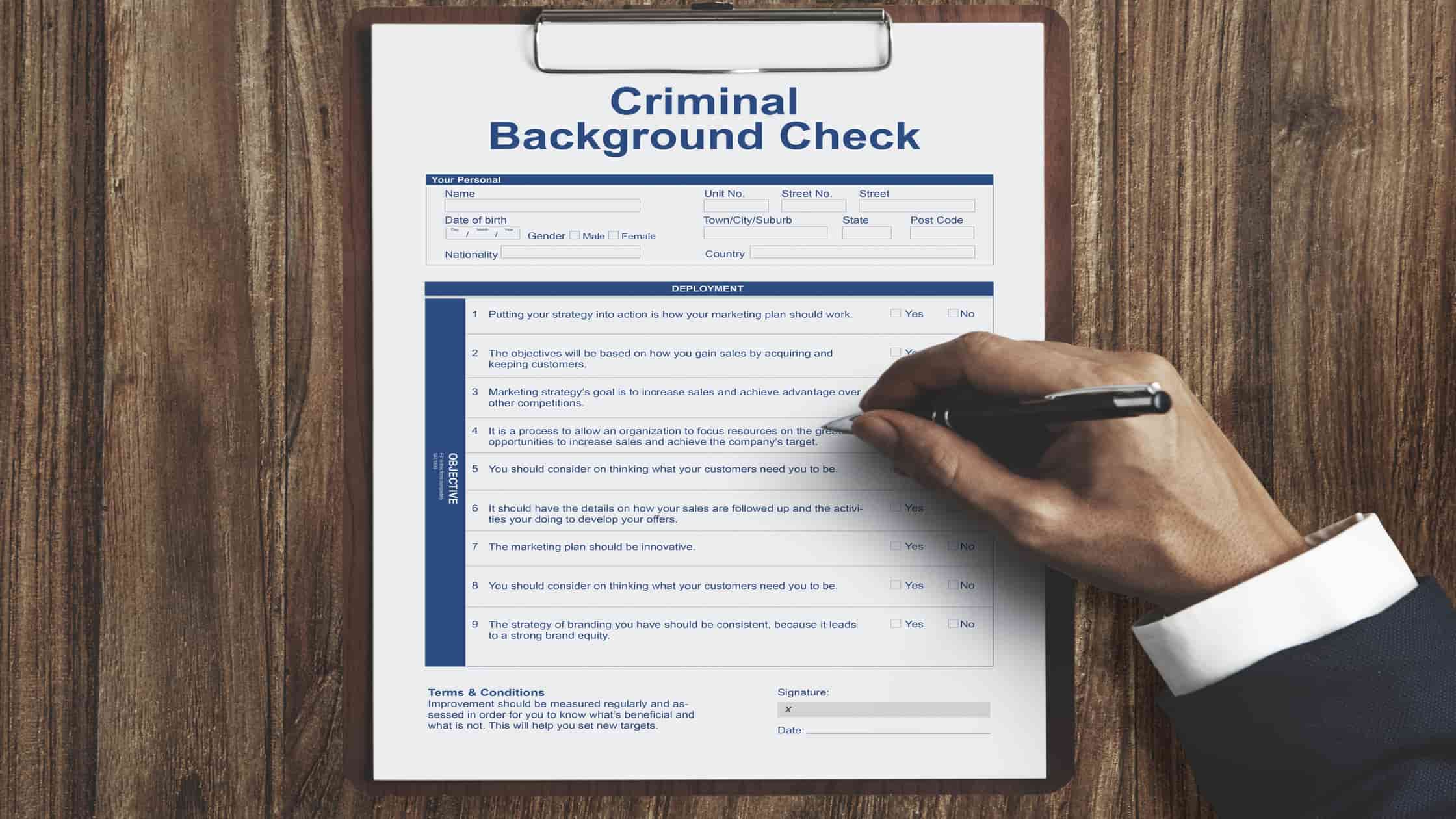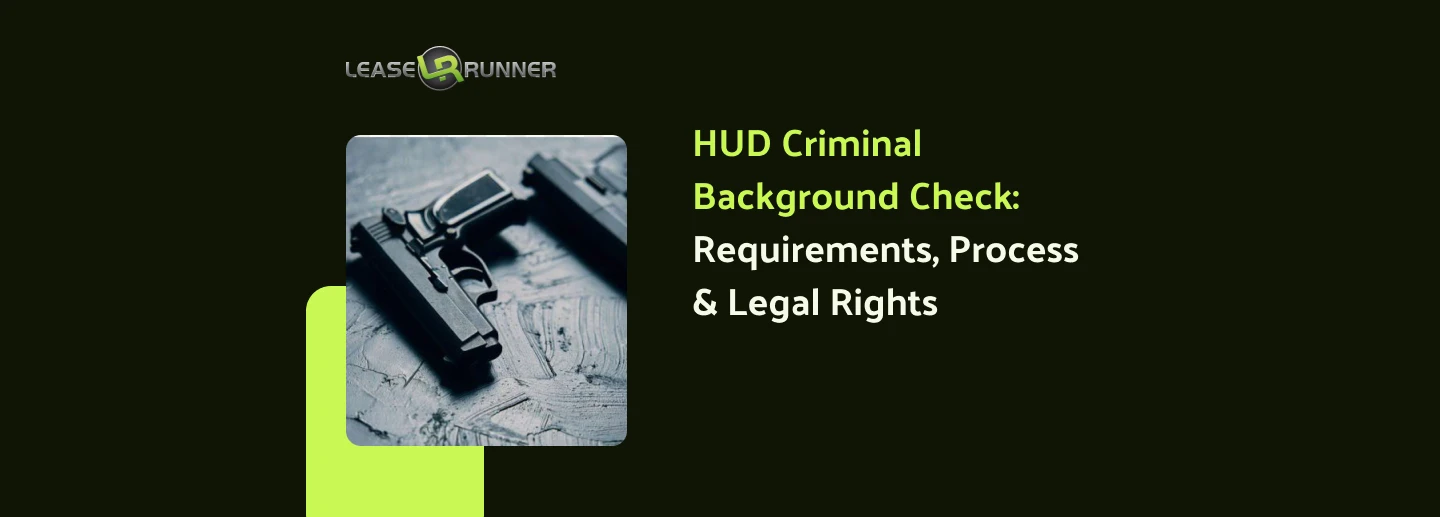The HUD criminal background check requirements keep housing safe and fair. These checks help landlords find tenants with risky criminal histories. Knowing what the HUD criminal background check looks at, like how far back does HUD background check goes and which crimes matter, is key for tenants and landlords.
For example, people on the sex offender list or caught making meth on HUD property are denied. Other crimes, like drugs or violent offenses, get a closer look. This article covers the main parts of the check, which include crime block housing, how long it takes, and tenant rights.
It also explains landlord duties, legal risks, and new rules. Whether you want Section 8 housing or manage HUD homes, knowing these rules helps you follow the law and avoid problems.

Quick Facts Table About HUD Criminal Background Check: Requirements and Others
What Is the HUD Criminal Background Check?
Anyone who wants to live in HUD-assisted housing must pass a criminal background check by HUD. It looks at an applicant's criminal history to keep residents and communities safe. This check balances safety with fair housing laws to avoid unfair discrimination.
For example, when applying for Section 8 housing, the background check for Section 8 tenants reviews felony convictions, sex offender registry status, and drug-related offenses. This helps housing authorities decide if the applicant meets HUD's safety rules.
According to HUD, landlords shouldn't turn away applicants only because they have been arrested but not convicted. Instead, they should think about the kind of offense, how long ago it occurred, and any evidence that the person has changed.
For example, someone who was convicted of drug use five years ago and then went through treatment could still be able to get in.
The check normally goes back 3 to 7 years, but certain crimes, like sex crimes, need to be looked at for the rest of their lives. HUD's new regulations also offer applicants time to explain or contest records that could keep them from getting housing. To understand deeply and know the basics to pass the background check, scroll down now!
Key Components
The HUD criminal background check includes:
- Searching federal, state, and local criminal databases for convictions.
- Checking the sex offender registry for lifetime registration.
- Reviewing drug-related offenses, especially those involving federally assisted properties.
The process uses multiple data sources to ensure thoroughness and accuracy.
Who Needs It?
This screening is required for all individuals who want to live in HUD-assisted housing, including Section 8 renters and those in other federally funded programmes. The requirement applies to everyone in the home who is 18 or older.
HUD Criminal Background Check Requirements
HUD requires all applicants for HUD-assisted housing to undergo a HUD criminal background check. This process helps ensure safe housing while complying with fair housing laws. The rules distinguish between offenses that always disqualify applicants. Therefore, those should be reviewed on a case-by-case basis.

Mandatory Disqualifying Offenses
Certain offenses lead to automatic denial of housing. These include:
- Lifetime registration as a sex offender under the Sex Offender Registration and Notification Act (SORNA). Anyone on this list cannot live in HUD-assisted housing.
- Conviction for manufacturing methamphetamine on federally assisted property. This offense results in a permanent ban.
An applicant convicted of methamphetamine production on HUD property will fail the HUD criminal background check. Consequently, they could be denied housing, no matter what other factors exist.
Discretionary Grounds for Denial
Other offenses require a case-by-case review. Landlords and housing authorities consider:
- The nature and seriousness of the crime.
- How much time has passed since the offense?
- Evidence of rehabilitation or other mitigating factors.
Common discretionary offenses include:
- Violent crimes like assault or robbery.
- Drug offenses not involving methamphetamine production.
- Property crimes, such as burglary or theft.
Documentation Landlords Must Review
Landlords must carefully review:
- Official criminal records and conviction dates.
- Court or probation documents provided by the applicant.
- Letters or proof of rehabilitation or mitigating circumstances.
This helps landlords apply HUD criminal records guidance fairly and consistently.
Applicant Rights Under HUD Guidelines
Applicants have rights, including:
- Receiving a copy of their background check results.
- The right to appeal denials and provide additional information.
- Protection against discrimination under the Fair Housing Act.
Tenants should request their screening reports early. This allows them to check for errors and prepare documents that support their case.

HUD Policy Updates and Best Practices
HUD warns against blanket bans on criminal records. Such policies can violate the Fair Housing Act due to disparate impact on protected groups. Best practices include:
- Limiting criminal screening to the minimum legal requirements.
- Conducting individualized assessments for each applicant.
- Giving applicants at least 15 days to submit mitigating information. The deadline will start after receiving a notice of potential denial.
These steps help landlords avoid discrimination claims and follow HUD's updated guidance.
Why Does HUD Require Criminal Background Checks?
HUD criminal background checks help keep housing safe and secure. They protect residents from people with serious crime histories. For example, screening stops applicants' drug-related offenses from moving into HUD-assisted housing.
This reduces risks like property damage and crime. Screening also helps landlords and housing authorities follow the law. It ensures they meet safety rules and fair housing laws.
By doing this, HUD promotes safe neighborhoods where families can live without fear. Tenants should know these checks are part of making HUD housing a safe place for all.
How Long Does the HUD Criminal Background Check Take?
Typical Timeline
Most HUD criminal background checks are completed within 1 to 3 business days. The timeline depends on:
- The completeness of the application.
- The responsiveness of references and employers.
- The efficiency of the screening company.
Example: If an applicant submits all documents and their references respond quickly, the process can finish in a single day.
Delays and How to Prevent Them
Delays often occur due to:
- Missing or incomplete information.
- Slow responses from employers or previous landlords.
- High application volumes during peak rental seasons.
Applicants should double-check their applications for completeness. Don't hesitate to notify references to expect verification requests. More importantly, respond promptly to landlord inquiries. This proactive approach can reduce the time that the HUD background check takes.
What Does the HUD Criminal Background Check Look At?
HUD uses criminal background checks to screen applicants for HUD-assisted housing. These checks cover many offenses to protect residents and comply with fair housing laws.
Types of Criminal Offenses HUD Reviews
HUD reviews:
- Felonies and misdemeanors.
- Violent crimes like assault and domestic violence.
- Drug offenses, including possession and trafficking.
- Sex offender registry status.
- Property crimes such as burglary and theft.
Landlords must carefully consider these offenses to make fair decisions.
How Far Back Does a HUD Background Check Go?
The look-back period varies by offense:
- Most crimes are reviewed for 3 to 7 years.
- Sex crimes and certain drug offenses tied to HUD property have no time limit.
Example: A theft conviction from eight years ago may not affect eligibility. Yet, the lifetime sex offender registration always disqualifies.
Useful Advice For Landlords And Tenants
Landlords should avoid blanket bans on all criminal records. Instead, they must conduct individualized assessments. This means considering:
- The crime's nature and severity.
- How much time has passed?
- Evidence of rehabilitation or good conduct.
For example, a tenant with a drug possession conviction who showed repentance deserves fair review.
Tenants should request their screening reports early to check for errors and prepare documents to support their case. This helps improve their chances under HUD criminal records guidance.
HUD also tells landlords not to use arrest records without convictions to refuse housing, since this might break the Fair Housing Act. Consistent, fair screening protects landlords from legal risks and supports equal housing access.
The Tenant Screening Process for HUD-Assisted Housing

The tenant screening process includes:
- Verifying identity and legal status.
- Confirming income and employment.
- Checking rental history for past evictions or lease violations.
- Performing the HUD criminal background check.
Landlords often use automated systems to streamline the screening process. However, sometimes manual and comprehensive tenant screening reports and reviews may be necessary for complex cases.
Tenant Outcomes and Consequences
If a tenant fails a HUD criminal background check, they may not be able to get housing. However, HUD rules state that landlords should think about important things before turning down an application.
These include how bad the crime was and when it happened and proof of rehabilitation. People who apply have the chance to appeal rejections or send in further proof to back up their case.
What Happens If Tenants Fail a HUD Criminal Background Check?
Tenants have important rights under HUD rules. They can:
- Request a copy of their screening report to check for errors.
- Dispute outdated or incorrect information in the report.
- Ask for reasonable accommodations if a disability affects their criminal history.
- Seek legal advice if they suspect discrimination based on race, national origin, sex, or disability.
Tenant Rights After Failing a Background Check
- Request their HUD criminal background check reports early. This allows time to correct mistakes and gather proof of rehabilitation.
- Avoid blanket bans on criminal records. Instead, they must conduct individualized assessments. The process should consider the nature of the offense, time spent, and rehabilitation efforts.
- Make clear, written policies aligned with HUD criminal records guidance. This will help landlords make fair decisions and reduce legal risks.
- Document all communications (for tenants denied housing). Consider filing complaints with HUD or fair housing agencies if discrimination is suspected.
Following these steps promotes fair housing and protects both tenants and landlords.
Run HUD-compliant background screenings with LeaseRunner—fast, fair, and by the book. 

One Wrong Check Could Cost You Federal Trouble
Landlord Responsibilities and Compliance
Landlords who rent to HUD-assisted tenants must follow clear rules when doing HUD criminal background checks. These rules protect tenants and communities while making sure everyone is treated fairly. Landlords must use the same screening process for all applicants, whether or not they get HUD help. This means no special or harsher rules for HUD tenants.
Landlord Responsibilities for HUD Background Checks
Landlords need a clear, written policy for screening. This policy should say which crimes cause automatic denial and which need a closer look. For example, landlords might deny people with violent crimes or drug manufacturing convictions.
Yet, they should review others on a case-by-case basis. This matches HUD criminal records guidance and stops unfair rejections. Landlords must tell applicants when they run a background check. If asked, they should give copies of the report. They also need to keep records of all decisions and reasons for denial. This helps if someone claims discrimination.
Example: When screening a Section 8 applicant, landlords should apply all of the criteria equally. If a person has a past drug offense but shows proof of rehab, landlords should think twice before saying no.

Legal Risks for Landlords Who Violate HUD Policies
Ignoring HUD criminal background check requirements can lead to serious legal consequences. Risks include:
- Violations of the Fair Housing Act due to blanket bans or failure to conduct individualized assessments.
- Lawsuits and fines for discriminatory screening practices.
- Loss of HUD funding or participation in HUD programs.
- Disparate impact claims if policies disproportionately affect protected groups, such as minorities.
- Penalties for using inaccurate or incomplete screening reports.
Example: Denying an applicant solely based on an arrest (without conviction) may result in legal action. HUD's 2025 guidance stresses reviewing each case carefully, considering the nature and timing of offenses.
Useful advice for landlords:
- Train staff on HUD criminal records guidance and fair housing laws.
- Keep detailed records of screening decisions.
- Apply policies consistently to all applicants.
- Review each applicant's criminal history individually.
- Allow tenants to provide evidence of rehabilitation or mitigating circumstances.
Following these steps reduces legal risks and promotes fair, effective tenant screening.
Understanding Disparate Impact and Fair Housing
The HUD criminal background check process must balance safety with fairness. One key concept is disparate impact, which happens when a policy seems neutral but affects some groups more than others. This is important because many criminal screening rules exclude protected groups, violating fair housing laws.
What Is Disparate Impact in HUD Screening?
Disparate impact indicates that a regulation or practice hurts a protected group even if it wasn't designed to be unfair. A blanket prohibition on every applicant with a criminal background, for example, may hurt black or brown applicants.
It's because certain groups are arrested more often because of problems in the system. The Fair Housing Act says that these kinds of rules may be challenged in court.
Legal Framework and Fair Housing Implications
The Fair Housing Act says that you can't treat someone differently because of their race, colour, religion, sex, handicap, family situation, or national origin. HUD makes sure that these regulations are followed while screening tenants. To avoid fines, landlords must make sure that their tenant screening for HUD housing follows certain rules.
Strategies to Avoid Discrimination
Landlords should:
- Use individualized assessments instead of blanket bans. This means reviewing each applicant's criminal history carefully.
- Consider mitigating factors and rehabilitation. For example, proof of completing a drug treatment program or steady employment can weigh in favor of approval.
- Avoid policies that exclude applicants solely based on arrests without convictions.
- Train staff on HUD criminal records guidance and fair housing laws to ensure consistent, lawful decisions.

Recent Changes to HUD Screening Policies in 2025
In 2025, HUD updated its rules for HUD criminal background check procedures. These changes aim to make housing fairer while keeping communities safe. The focus is on detailed, fair reviews instead of automatic rejections.
Case-by-Case Reviews Over Blanket Bans
Landlords must now review each applicant's criminal record carefully. They cannot reject all applicants with any record. For example, a tenant with a drug offense from several years ago might still qualify if they show good behavior and steady work since then. This approach helps give people a fair chance.
More Focus on Rehabilitation
HUD requires landlords to consider proof of change. This includes documents like letters from employers, certificates from rehab programs, or good references. Such evidence can help tenants with past offenses get housing.
Clear Rules to Avoid Discrimination
HUD warns landlords not to use rules that unfairly impact certain groups. For example, banning all applicants with any criminal record can hurt minorities more. Landlords must apply rules fairly to everyone.
Landlords should update policies and train staff on these rules. Tenants should provide full information and proof of rehabilitation. These updates help make housing safer and fairer for all.
Conclusion
Knowing HUD criminal background check requirements helps keep housing safe and fair. Landlords follow HUD criminal records guidance to protect tenants and obey fair housing laws. Understanding how long does HUD background check takes, what crimes cause denial, and how far back checks go also helps renters and landlords.
For example, people on the sex offender registry or caught making meth on HUD property are denied. Others get a case-by-case review. If a tenant fails, they can ask to see the report and appeal the mistakes. New HUD rules favor looking at each case, not banning all with records.
To avoid delays, renters should give full info. Landlords must treat all fairly. Good communication and clear rules help everyone get housing safely.
FAQs
Q1. How long does a HUD criminal background check take?
A HUD criminal background screening usually takes 1 to 3 business days. The time depends on how fast agencies process records and verify details. For example, if an applicant sends all the needed documents quickly and references quickly, the check can finish in one day.
Delays happen if applications lack information or during busy rental seasons. To avoid delays, applicants should provide full, accurate details upfront. Keeping in touch with landlords or housing authorities is also needed.
Q2. How far back does a HUD background check go?
The HUD criminal background check looks back 3 to 7 years for most crimes. Some offenses, like lifetime sex offender registration on HUD property, have no time limit and cause permanent denial. For instance, a felony from five years ago will be reviewed, but a sex offense from 15 years ago is also considered.
Q3. What happens if I fail a background check for an apartment?
If you fail a HUD criminal history check, you may not be able to get housing. Tenants can still appeal or provide evidence that makes their case stronger. Before refusing, landlords must look at this kind of proof according to HUD criminal records guidelines.
Tenants should seek copies of their screening results. Based on that, they can check for mistakes and have their documentation ready to support their case.
Q4. Who approves apartment applications with HUD?
Landlords, property managers, or leasing agents approve applications for HUD housing. They must follow HUD criminal background check requirements and apply screening rules equally.
Landlords must use HUD guidance to ensure compliance with the Fair Housing Act. Knowing who approves applications helps tenants know who to contact with questions or appeals.
Q5. What is the required screening for HUD housing?
Screening for HUD housing includes a criminal screening, income, and rental history review. Landlords confirm applicants meet HUD safety and financial rules. For example, they check if income covers rent and if past landlords report timely payments and no lease issues.
The tenant screening for the HUD housing process ensures tenants have stable income and no criminal records. Applicants should prepare pay stubs, references, and screening reports to speed approval.





